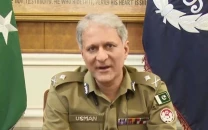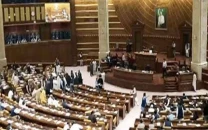US asked to show restraint vis-à-vis Afghanistan
Speakers say any miscalculation by super power can cause instability in Afghanistan

Speakers have asked the United States to show restraint in framing policies vis-à-vis Afghanistan after the Taliban takeover, otherwise, the war-torn country could slip into chaos and stability.
They were speaking at a book launch organised by the Institute of Strategic Studies Islamabad (ISSI) and Friedrich-Ebert-Stiftung (FES) Pakistan. The book “Pakistan-Afghanistan Relations: Pitfalls and the Way Forward,” has been authored by Dr Huma Baqai, Associate Professor Social Sciences, IBA Karachi and Dr Nausheen Wasi, Assistant Professor, Department of International Relations, University of Karachi.
FES Country Director Dr Jochen Hippler, Ambassador (retd) Asif Ali Khan Durrani, IPRI Senior Research Fellow Zahid Hussain, ambassador (retd) Qazi Humayun, ISSI Director-General Aizaz Ahmad Chaudhry and others were among guest speakers.
ISSI Director-General Aizaz Ahmad Chaudhry said that the political landscape in Afghanistan has changed and Afghans, as well as the neighbours of Afghanistan, are yearning for peace and stability. The postulate that there can be no military solution in Afghanistan still holds.
Read Anti-Taliban US bill
He said that there is a firm consensus that an inclusive setup needs to be in place for sustained peace in Afghanistan. Chaudhry said that for Pakistan in particular, there was a need of an assurance from the Taliban that the banned TTP will not be given space to operate from Afghanistan.
He remarked that the approach the US was presently taking might create huge instability in Afghanistan and if the Americans have their way, the Taliban government might collapse and Afghanistan will revert back to pre-2001.
Dr Jochen Hippler said while talking about the Pak-Afghan bilateral relations, there is a consensus in the opinion that it has been viewed primarily through government-to-government relations.
He said that the bilateral relationship has been influenced by the internal changes and internal contradictions there and that we can learn from the events in Afghanistan.
He said when we discuss the Pak-Afghan relationship, we should know this bilateral dimension not only has a regional dimension to it but is also a matter of global politics.
Published in The Express Tribune, October 1st, 2021.


















COMMENTS
Comments are moderated and generally will be posted if they are on-topic and not abusive.
For more information, please see our Comments FAQ